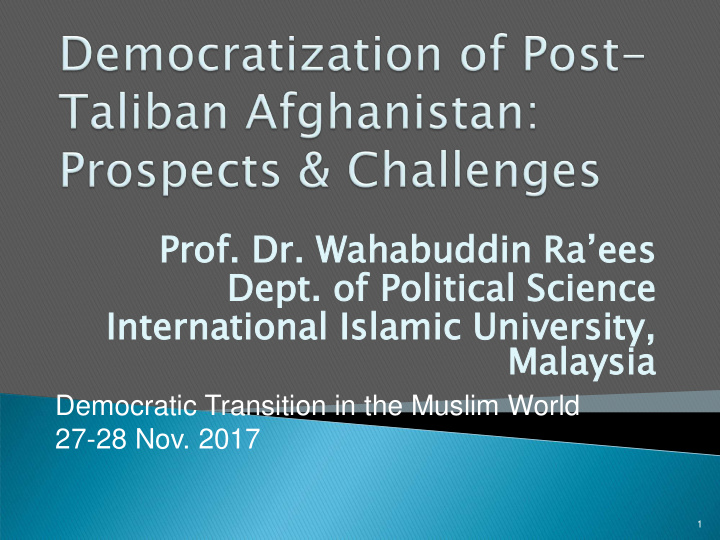



Prof. Dr. Wahabuddin Ra’ees Dept. t. of of Po Politic litical al Scie ience nce In Inte ternation national al Is Isla lamic mic Univer versity, sity, Mala laysi ysia a Democratic Transition in the Muslim World 27-28 Nov. 2017 1
2
A bit of History 1. Collapse of the Taliban and the American 2. Invasion Achievements 3. Challenges 4. Prospects 5. 3
Afghanistan: Monarchy moving towards constitutional monarchy: before 1973 Republic: 1973-1978 Communist Coup and the Soviet invasion; 1978-1992 The Mujahiddeen (anti-Soviet resistance) and the Taliban: 1992- 2001 4
5
Afghanistan’s institutional set -up had totally collapsed. It had become a failed state Stipulated democratization of Afghanistan and Introduction of democratic institutions 6
Art. 4 of the Agreement made reference to: promulgation of a constitution elections Mandated a Transitional Government to facilitate full scale democratization of Afghanistan 7
Constitution was ratified on January 2004: provides for effective system of checks and balances Laws on political parties was introduced in March 2004 Law on elections was introduced in May 2004 Independent Election Commission was introduced in Nov. 2005. Before that Joint Electoral Management Body (JEMB) 8
Election Complaint Commission (ECC)- composed of two Afghans and three international figures Elections held: 3 for the president (9 October 2004, 20 August 2009, 2014) 2 for the parliament (18 Sept. 2005 and 18 Sept. 2010, next one due in 7 months time) 9
Civil Society-Human Rights groups, Elections Observers, women rights associations etc. appeared on the Afghan political scene 10
1. Absence of party politics and party system. Candidates contested as independents. Afghanistan needs 2-5 strong multi-ethnic and inclusive political parties 11
2. Reform of Electoral system and districting need reforms: Currently single non- transferrable vote system (SNTV) with multi- member provincial constituency system with candidates with the highest votes as the winner. Suggested first-past-the-post voting/proportional representation based on party list system with dividing the country into constituencies proportionate to the number of wolesi jirga of provincial and district level councils, also proportionate to the population of the respective provinces and districts. 12
3. Lack of Political will by internal actors and their international backers to institutionalize democracy (most important) Attempts to delay parliamentary and even presidential elections due to fear of losing what they have gained since 2001 13
Prospects People’s belief in genuine democracy. 1. Almost all people agree that democracy can rid society of corrupt leaders, the fear is whether elections will be free and fair President Ghani appears to have the will to 2. institutionalize democracy. Determination to hold elections on time 3. Calls for inclusive elections-(internally 4. displaced, refugees, conflict-ridden areas to have representative and take part in presidential elections 14
4. Integration of armed opposition into political process through Intra-Afghan peace talks i. Signed peace treaty with Hezbe Islami ii. Negotiation with Taliban going on (US, Russia, China, Indonesia, Qatar to play a role) 15
16
Recommend
More recommend